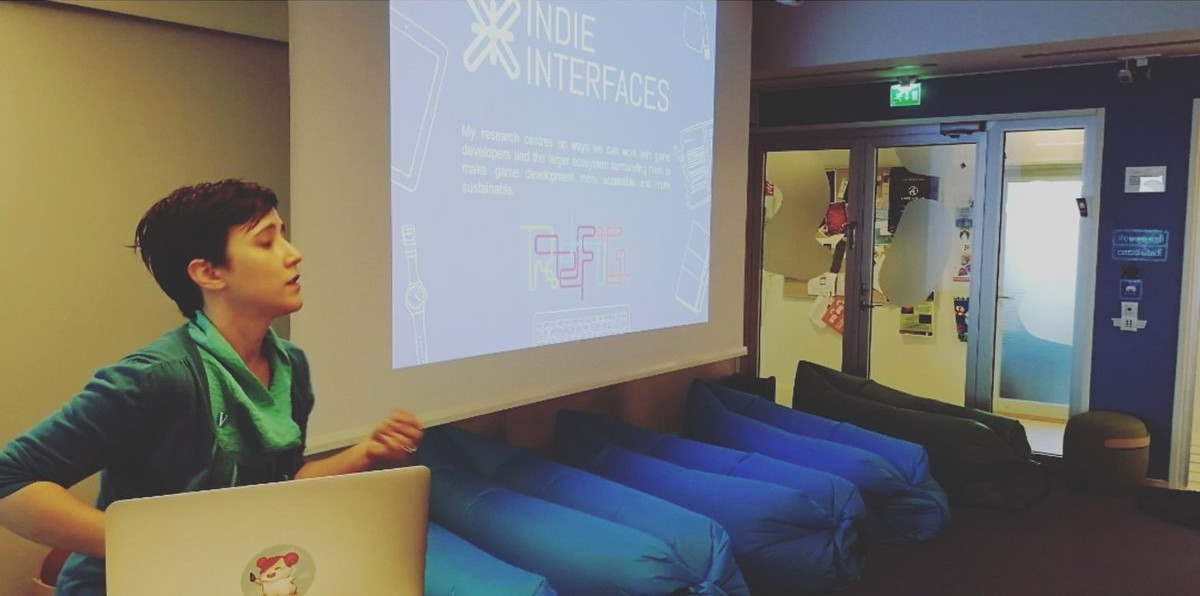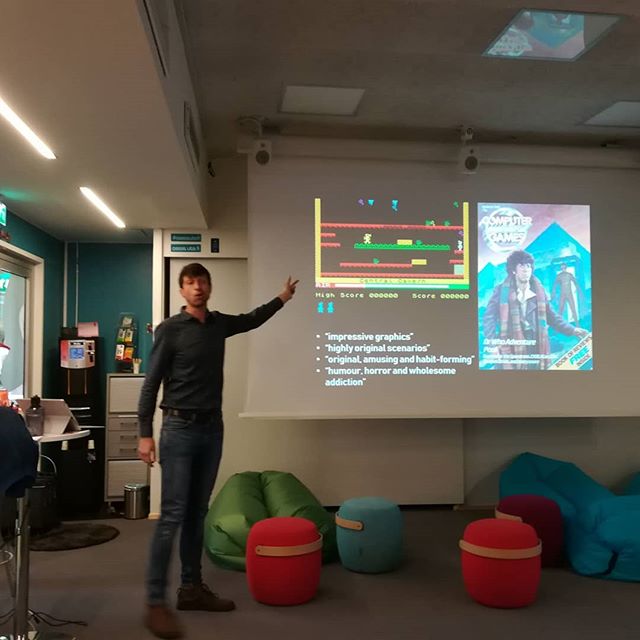OASIS hosts various talks on academic and non-academic topics. These talks are always free and open to everyone.
We try to live stream as many talks as we can and you can find new live streams on the OASIS YouTube channel, event information on the OASIS
Facebook-page and recordings of most of our previous talks on the Centre of Excellence in Game Culture Studies YouTube channel.
Our current talk series is called OASIS Lunchtime Talks and you can find the schedule and information about the talks below.
In addition to this curated series, the page highlights other types of OASIS Talks, past and yet to come.
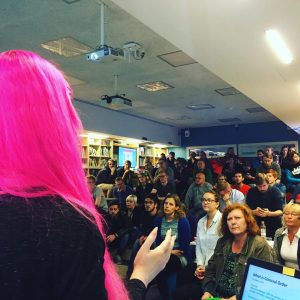

OASIS LUNCHTIME TALKS - SPRING 2024
OASIS Lunchtime Talks is a series of lectures on current research by fascinating scholars from near and far.
The talks are usually held on Thursdays during lunch hour (12.00 - 13.00 or 12 PM to 1PM).
The lecture series was created by Olli Sotamaa and the current series of OASIS Lunchtime Talks is curated by Heikki Tyni and produced by Mikko Seppänen and Elisa Wiik.
Thursday - April 18th
12.00 - 13.00
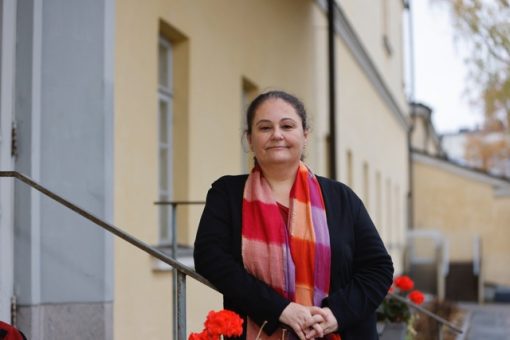 Video Games, Environmental Awareness and Climate Change
Video Games, Environmental Awareness and Climate Change
Xenia Zeiler
Environment, sustainability and climate change related themes in and around games increasingly abound. Among them, some new Asia produced games take distinct approaches to facilitate and support environment appreciation and awareness. By discussing two exemplary games and their gamevironments – specifically, interviews with and statements from game developers, debates and reviews from players and comments on gameplay videos – this talk explores how nature environment related themes are taken up in these games and how this is entertained and received, by players and beyond.
Xenia Zeiler is Professor of South Asian Studies at the University of Helsinki. Her research and teaching are situated at the intersection of digital media, culture, and society, specifically as related to India and global Indian communities. Her focus within this wider field of digital culture is video games and gaming research, in India and beyond. Closely related to and supporting this are her other major research areas: digital religion, popular culture, cultural heritage and mediatization.
Watch the live stream on YouTube: https://www.youtube.com/watch?v=_Bk_PzogmT4
Wednesday - April 17th
13.00 - 14.00
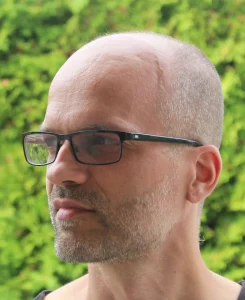 Indie Porn Games: Contents, Ecosystems, Business Models
Indie Porn Games: Contents, Ecosystems, Business Models
Petri Lankoski
In his talk, Prof. Petri Lankoski delves into indie porn games, their contents, development ecosystems and business models as well as how those are connected. The primary funding model of porn games, the Patreon type crowdfunding, which often results in content leaning towards heteronormativity, potentially marginalizing non-binary perspectives. Throughout the funding phase, backers gain access to game development progress, although the primary allure lies in community involvement and influencing the project. The completed or near-completed games are subsequently distributed on other platforms like Steam. These games encompass a diverse array of sexual behaviors, often drawing from tropes found in pornography. Visual novels and adventure games are among the most prevalent formats.
Petri Lankoski, D.Arts, is an Associate Professor of Game Studies at Södertörn University, Sweden. His research centers on game design, with a particular emphasis on the interplay between game design and player experience/emotions, games as fiction, and the relationship between game content and game mechanics.
Watch the live stream on YouTube: https://www.youtube.com/watch?v=T2IjzhEaEXo
Thursday - April 4th
12.00 - 13.00
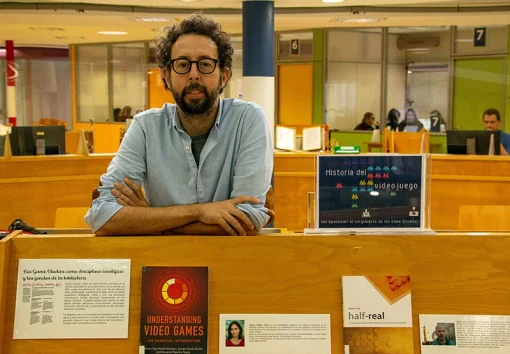 Playing Emotions: How to Bring Indie Games to the Classroom
Playing Emotions: How to Bring Indie Games to the Classroom
Jorge Oceja
There are many ways to incorporate video games into the classroom. However, different theoretical positions influence the selection of games and, most importantly, the modes of use. In this talk, Dr. Jorge Oceja will delve into the sociocultural methodologies, advocated by scholars like James Paul Gee, for weaving games into pedagogy. The talk illustrates this approach through Playing Emotions, an educational tool implemented in several Spanish schools over the years. Playing Emotions aims to assist secondary education teachers integrating video games into their teaching by providing activities that enhance their students' socio-emotional competencies through independent games. Dr. Oceja will explore some of these activities and discuss other potential games and pedagogical strategies for implementation.
Dr. Jorge Oceja has worked as an elementary and secondary teacher for many years in different countries. He holds a degree in Educational Psychology, a master's degree in Educational Technology (Fulbright Scholarship at California State University), and a Ph.D. in Education Sciences. He currently works at the University of Cantabria in Santander and collaborates with the Botín Foundation (the biggest private foundation in Spain) on projects related to the educational possibilities of video games.
Watch the live stream on YouTube: https://www.youtube.com/watch?v=H-LxZgxsHtU
Thursday - March 14th
12.00 - 13.00
Creativity: in academic research, narrative, and world-building
Ian Sturrock
Dr. Ian Sturrock takes us on a playful wander through the theory and practice of creativity, inspired by real science in the same kind of way that a big silly Hollywood summer movie is inspired by real history, and also drawing on the personal practices of Ian himself and others. How do you fit themes into your stories? How do you use your game design practice to spread your ideal of Cultural Marxism to unsuspecting gamers? How do you make your academic research a bit easier and more fun? Includes your weekly required minimum Oasis talk mention of Brian Sutton-Smith and, for those who might need it, a brief reminder of the existence of the Roman Empire.
Dr. Sturrock is a game designer of tabletop RPGs, supplements, and adventures for Pelgrane Press, Green Ronin, Hogshead Publishing, Modiphius, Guardians of Order, Mongoose Publishing and more. In the digital games sphere he’s worked for Sony, Ubisoft, and others. Dr. Sturrock teaches and researches at Teesside University, with particular interests in motivation for play, game design, game studies, tabletop RPGs, and games narrative. In his spare time, he games, larps, plays capoeira, learns medieval longsword combat, and runs a small press TTRPG publisher, Serpent King Games.
Watch the live stream on YouTube: https://www.youtube.com/watch?v=wRfrY-EFiXY
Thursday - February 22nd
12.00 - 13.00
Arcade Britannia: British Arcade History, Comics, and Interactive Experiences
Alan Meades
Prof. Alan Meades (CCCU UK) will discuss Arcade Britannia, a project that combines local and social history, the love of arcades, and models for engaging with diverse audiences (books, comics, interactive experiences). Arcade Britannia (MIT Press, 2022) tells the story of the development of the British amusement arcade as a cultural space, the growth of the British and industry, and the influences of legislation, groups, and international business from the 1900s to the present day.
Alan Meades is Professor of Game Design at Canterbury Christ Church University (UK) and the author of Arcade Britannia (2022), and Understanding Counterplay in Videogames (2015). He leads the Games Design provision at CCCU and plays Street Fighter 2 badly.
Watch the live stream on YouTube: https://www.youtube.com/watch?v=ECxrxk9YHXs
February - Friday 16th
12.00 - 13.00
THE RULES WE BREAK - Lessons in Play, Thinking, and Design
Eric Zimmerman
What good is game design? In this highly interactive talk, Eric Zimmerman will share ideas and playful activities from THE RULES WE BREAK - Lessons in Play, Thinking, and Design - a compendium of exercises from more than three decades of teaching. Eric will lead us through some of the exercises in the book that teach the fundamentals of design (systems thinking, the semiotics of play, narrative design, the iterative process) through play and games. Making a case for the relevance of game design, he will connect concepts from play and games to the challenges of our present historical moment.
Eric Zimmerman is a game designer and Arts Professor at the NYU Game Center. A three decade veteran of the game industry, Eric designs play on and off the computer. Recent projects include Dear Reader, a game published by Apple that uses classic literature as the basis for word puzzles, and The Green Games Guide, an industry initiative to design and manufacture environmentally sustainable tabletop games. Eric is the co-author of Rules of Play with Katie Salen and more recently The Rules We Break.
Watch the live stream of the talk on YouTube: https://www.youtube.com/watch?v=oahs3GU3S9E
Thursday - January 18th
12.00 - 13.00
Making Games Differently
Casey O'Donnell
In November of 2014 prof. Casey O’Donnell published Developer's Dilemma: The Secret World of Videogame Creators with MIT Press (2014), the first long-term ethnographic account of a "AAA" game development studio. The book called on game academics and developers to take a active role in shaping the work practices and cultures that surround game making. One aspiration was to see a future where where "crunch," or extensive overtime, and toxic workplace cultures and work practices might diminish. Given the significant shifts in work worlds "post" COVID-19, the relative collapse of Game Workers Unite (GWU) in the United States and other locations, and the "Great Resignation" as it has been called, is the time to examine what might emerge in the future. In his talk, prof. O’Donnell sketches the contours of his new project, Making Games Differently. It is not about the current state or status quo of game making. It is not about what is, but about what game making could become through a lens of prefigurative politics.
Department of Media and Information at Michigan State University. He is a 2023-2034 Fulbright-Finland Scholar at Tampere University affiliated with the Centre of Excellence in Game Culture Studies and Game Research Lab. His research examines the creative collaborative work of (video)game design and development and production studies generally. His book, "Developer's Dilemma" is published by MIT Press. He is an active game creator, with his collaborative work on Creative Dying Card Game being nominated for an IndieCade Best Tabletop Award in 2022. His research has been funded by the National Science Foundation (NSF) and the National Institute of Health (NIH).
Watch the live stream on YouTube: https://www.youtube.com/watch?v=qMOA3Zuxrhw
OTHER OASIS TALKS - SPRING 2024
Monday - February 12th
12.00 - 13.00
The Value of Toys in a Post-Digital World
Katriina Heljakka
In a play world dominated by games and gameplay, one might wonder if toys are valued as playthings anymore. This talk explores toys, media, and machines from the perspective of object play, meaning play where the physicality, tangibility, and displayability of artifacts continue as meaningful aspects of human interaction with toys amidst and alongside the digitalization and Internet-connectedness of contemporary play. How do toys generate play value and promote long-term play as physical entities as we head toward a post-digital world?
Dr. Katriina Heljakka is a researcher of toys, play, and playful learning at the University of Turku. She received her doctorate (in visual arts) at the Aalto University in 2013 and has since worked in the Academy of Finland-funded projects Ludification and the Emergence of Playful Culture, Hybrid Social Play (together with Business Finland), and most recently, the Centre of Excellence in Game Culture Studies. Her current research interests include speculative toy fiction, play machines, and playful learning in work and higher education.
Watch the live stream on YouTube: https://www.youtube.com/watch?v=jnQ_qSZBcL0
Past OASIS Lunchtime talks
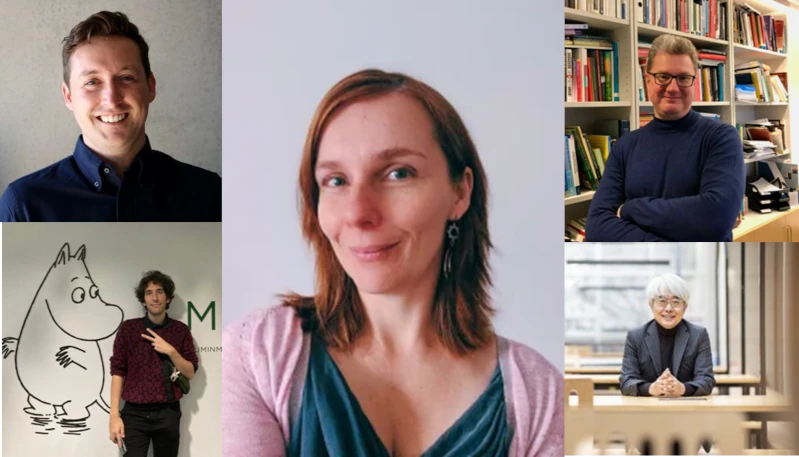
OASIS LUNCHTIME TALKS - AUTUMN 2023
Games and Exhaustion
Rainforest Scully-Blaker (Tampere University, Center of Excellence for Game Culture Studies)
Ephemeral ecologies: player paratexts at the end of the world
Lawrence May (University of Auckland)
The “Critiqueless” Critique of Gamification
Mikko Vesa (Hanken School of Economics / University of Lapland)
Promises, Politics, and Pipelines: Implicit and Explicit Lessons from Games Higher Education
Alison Harvey (Glendon College, York University)
Game Studies without Culture? A Historical Review of Video Game Research in Korea
Tae-Jin Yoon (Yonsei University, Seoul, Korea)
OASIS LUNCHTIME TALKS - SPRING 2023
Ukrainian Game Jam Scene: Creativity in Extreme Conditions
Oleksii Izvalov (Robert Elvorti Economy and Technical Institute)
Replayed: Software Preservation and Game Histories (Book Talk)
Dr. Henry Lowood (Stanford University)
The LVLup! Museum: From experimental initiative to national institution
Camille Laurelli (Educational Center at National Library of Estonia)
(Re)Playing Cultural Memory: The Why and How of Studying Nostalgia in Video Games
Diego A Mejía-Alandia (Tampere University, the Centre of Excellence in Game Culture Studies)
In-game interaction, identities and communities – or what does it mean to play together?
Matilda Ståhl (Åbo Akademi University)
How to study Japanese video games: A reflection on my stay abroad in Japan
Joleen Blom (Tampere University, the Centre of Excellence in Game Culture Studies)
From Research to Development - A Transit King Story
Janne Paavilainen (BON Games)
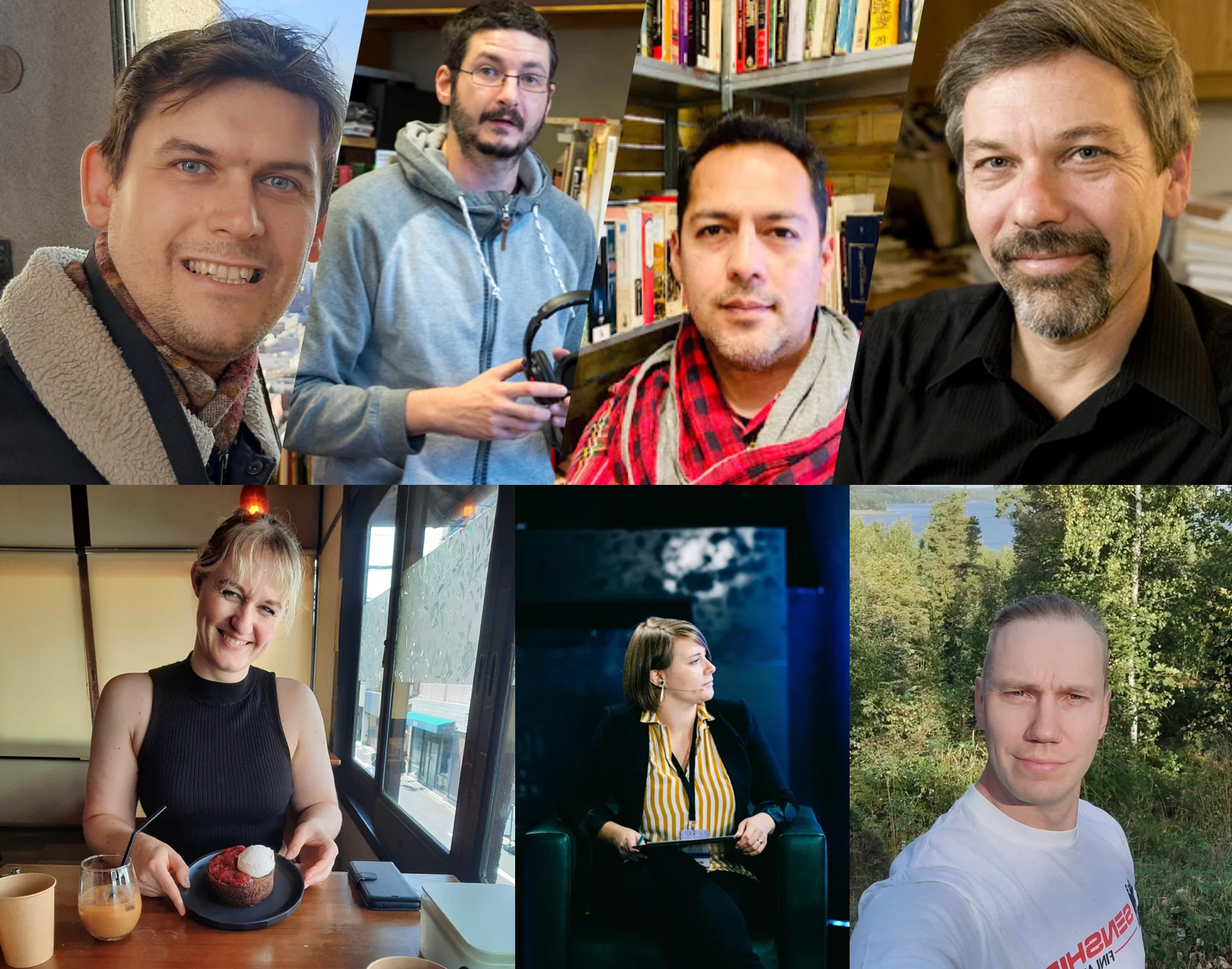

OASIS LUNCHTIME TALKS - AUTUMN 2022
Care Tactics - Practicing Safe Storage at Gaming Events
Nick Taylor (York University)
International Solidarity Between Game Workers in the Global North and Global South – Reflections on The Challenges Posed by Labor Aristocracy
Emil Lundedal Hammar (Tampere University, the Centre of Excellence in Game Culture Studies)
OASIS LUNCHTIME TALKS - SPRING 2022
The Value of NFTs in Games
Alesha Serada (University of Vaasa)
Playing with toy soldiers? A look at miniaturing
Mikko Meriläinen (Tampere University, the Centre of Excellence in Game Culture Studies)
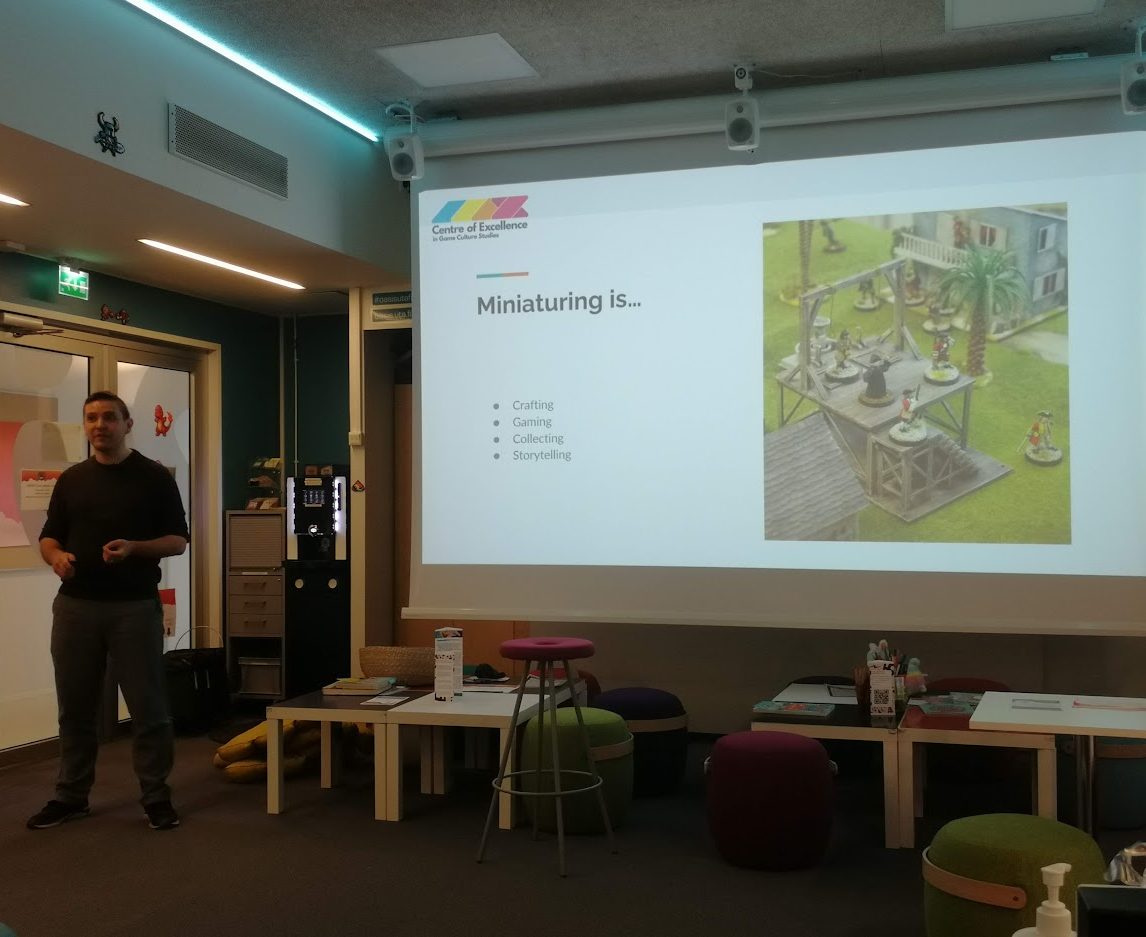

OASIS LUNCHTIME TALKS - SPRING 2020
Handmade Pixels: Indie Video Games and the Quest for Authenticity
Jesper Juul (Royal Danish Academy of Fine Arts, School of Desig)
OASIS LUNCHTIME TALKS - FALL 2019
Ask Why: Creating a Better Player Experience through Environmental Storytelling and Consistency in Escape Room Design
Scott Nicholson (Wilfrid Laurier University)
Age Appropriate Game Design
Darshana Jayemanne (Abertay University)
Zen Mode: on Buddhism, McMindfulness, and orientalism in games
Victor Navarro-Remesal (Comillas Pontifical University)
Fun Things are Fun: Exploring the Games & Life of Karl Rohnke
Pete Vigeant (ESC Games)
Thoughts on Existential, Transformative Game Design
Dr. Doris Rusch (Uppsala University)
Assemblage agency and the games that play us
Maria Ruotsalainen (University of Jyväskylä)
Ethics in theory, justice in practice: Insights into practical challenges between game research contexts
Dr. Florence Chee (Loyola University Chicago)
Digital Dreamers? Researching the Lives of Videogame Workers
Anna Ozimek (Tallinn University)
Finnish and Polish educational board games in the mid-19th century
Maria Garda (PhD) (University of Turku)
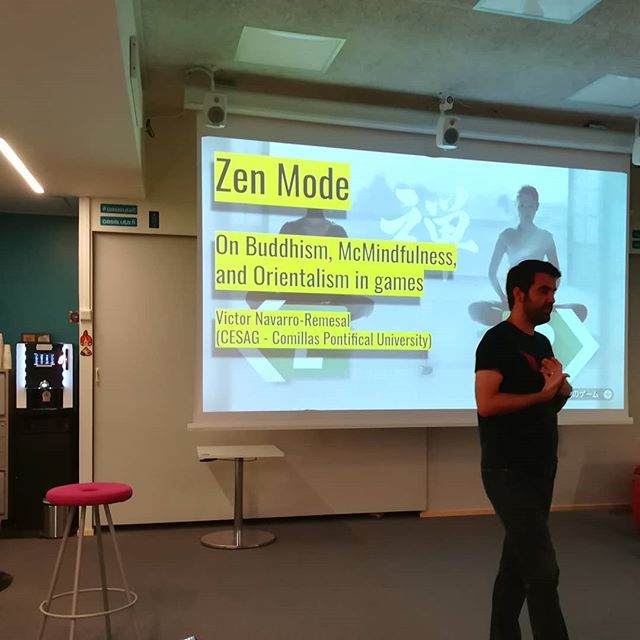
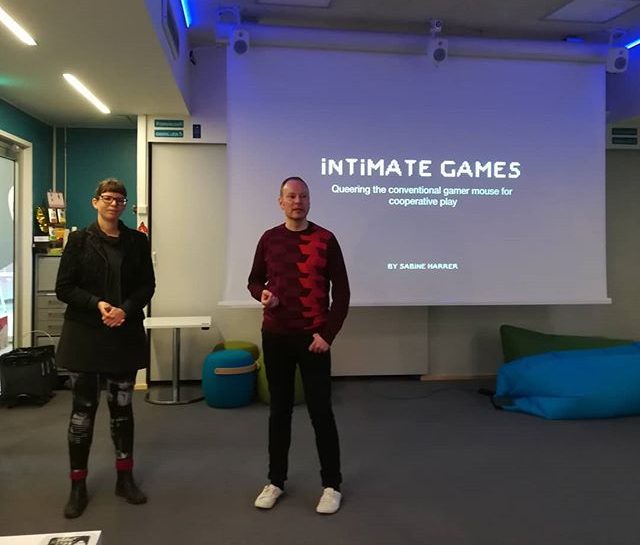
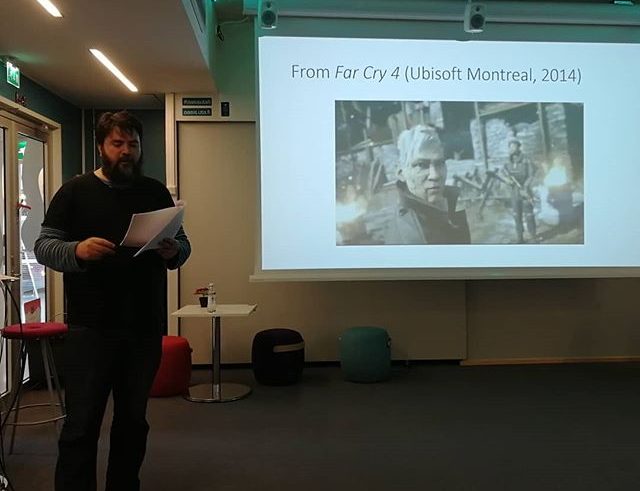
OASIS LUNCHTIME TALKS - SPRING 2019
The Gamer Logic of “Selfies are Avatars”: Toxic Masculinity and James Franco’s Strategic Vulnerability
Tom Apperley
Intimate Games: Queering the Conventional Mouse Controller for Cooperative Play
Sabine Harrer
Resisting Patches & Updates: Struggles against Protocological Power in Video Games
Jan Švelch
Understanding the Australian Videogame Field through Formal, Informal, and Embedded Gamemakers
Brendan Keogh (Queensland University of Technology, Brisbane)
Sense of Place in Videogames: Case Red Dead Redemption
Jussi Holopainen (Games Computing, University of Lincoln)
Regulatory change and cultural peculiarity - horse people and the new gambling monopoly in Finland
Pauliina Raento
OTHER OASIS TALKS - 2018
MSP Challenge 2050: first results of fourth-generation simulation gaming for maritime spatial planning
Harald Warmelink (NHTV Breda University of Applied Sciences, Netherlands)
On the Possibility of a Paratelic Initiation of Organizational Wrongdoing
Mikko Vesa (Hanken School of Economics, Helsinki)
Toxic Meritocracy of Video Games: Why Gaming Culture Is the Worst
Christopher Paul (Seattle University)
Salvation, or Snake Oil, Big Data Practices in the Game Industry
Jennifer R. Whitson (University of Waterloo)
Amateur adaptations of “professional” games: Manic Miner and Flappy in 1980s Czechoslovakia
Jaroslav Švelch (University of Bergen / Charles University Prague)
